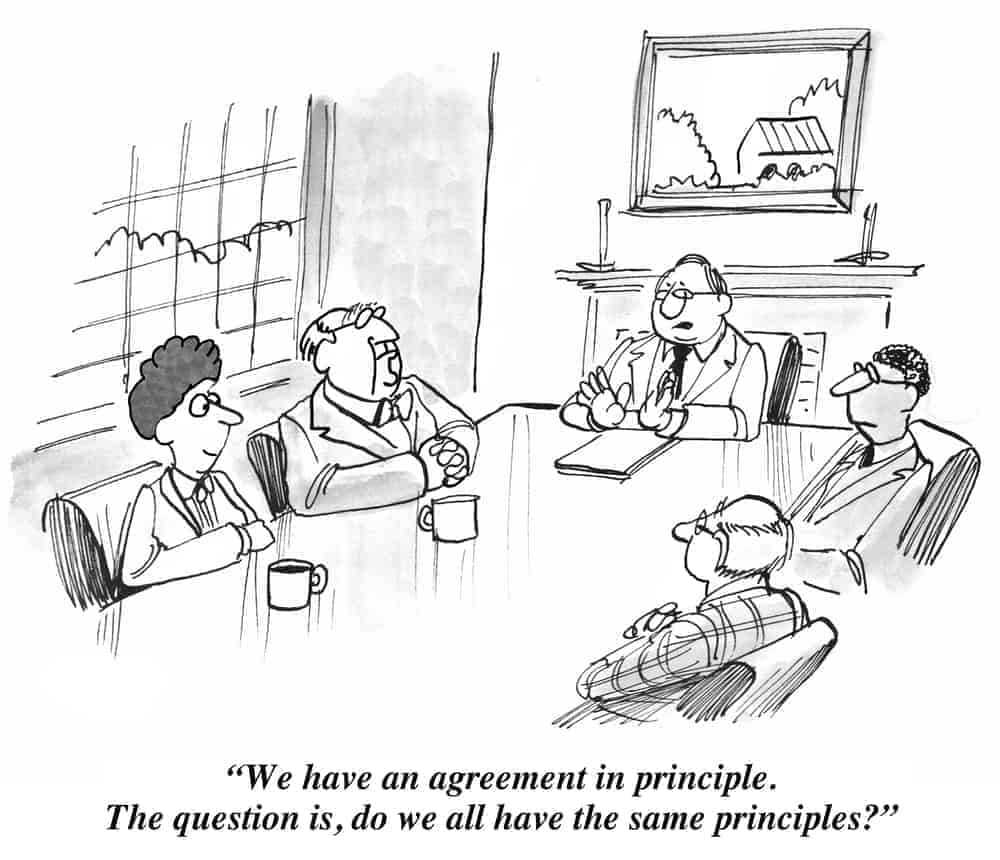Ethical Guidelines in Mediation

Ready to find answers to these questions and more:
- Can a mediator provide legal advice while mediating a case?
- Can a mediator guarantee mediation outcome?
- Can a mediator be paid based on results?
- How a mediator can be neutral while settling business disputes between large corporations and small business?
- How to check a mediator conflict of interest?
- Is there a universal mediation code of ethics?
Let's get started!
Because mediation lacks concrete governing regulations in most of the United States, it can be difficult for new mediators to fully understand their role and ethical responsibilities.
Mediation is a voluntary, non-binding, structured method of negotiating a dispute with the guidance of a neutral third party, the mediator.
The mediator helps facilitate communication; seeks out possible areas of compromise; identifies, defines, and removes roadblocks to resolution; and promotes understanding between parties.
Mediation is a flexible process that allows for creativity and ingenuity in problem solving. And this flexibility means that mediators room to develop their own unique approach.
Despite this, mediation is not a ‘wild west’ field where anything goes. Each association and jurisdiction will have their own conduct guidelines, and there are certain ethical standards to guide a mediator in any interaction with a client.
The purpose of this article is to help mediators understand their ethical responsibilities and help potential clients understand what to expect and how the practice of mediation protects their interests.
As a professional mediator, you should act immediately if ethical issues arise. If you belong to a network or mediation association, contact someone for advice and/or assistance if needed.
As a client, take the time to understand what to expect from your mediator before you hire someone. This will help you find someone knowledgeable and reliable. If you notice questionable behavior once you’ve hired a mediator, be sure to ask questions and get the issue resolved quickly.
Table of Contents
The following sections provide a detailed outline of important and appropriate mediator behaviors. We will cover these topics:
- Inform Clients about Ethics in Mediation
- Safeguard Voluntary Participation
- Ensure Subject Competence
- Protect Privacy
- Stay Impartial
- Avoid Legal Advice
- Abstain from Marketing Guarantees
- When to Withdraw
- Summary of Ethics in Mediation
1. Inform Clients about Ethics in Mediation
Depending on the practice area, clients likely won’t have a previous experience of mediation. New clients may not understand the role of the mediator, His/Her own role, or what to expect from their sessions.
In a private, pre-session meeting, mediators should carefully explain:
1.1. The process
All parties should understand and agree to the mediation process. They need to understand their role, the mediators role, and their relationship to the mediator. Clients should also know the type of mediation practiced and the typical procedures that exist within those parameters.
By the first session, parties should recognize that the mediator isn’t there to judge or make decisions, He/She is there to oversee negotiations and help clients come to their own agreement.
1.2. The contingency options
The parties involved should be aware of their full set of options, including other forms of alternative dispute resolution (ADR), like arbitration.
They should understand both the benefits and limitations of mediation and what they can do if they decide not to move forward with mediation or if they are unable to come to a resolution during the process.
While giving legal advice is not allowed, some mediators may have enough knowledge about the legal system to evaluate the strengths and weaknesses of both cases and suggest possible outcomes in court or arbitration. (This is not considered legal advice in most jurisdictions).
A mediator should let the parties know early on if this is offered.
1.3. The terms of agreement

Before an agreement is signed, a mediator should take the time to ensure both parties fully understand the parameters of agreement and their responsibilities within it. If the mediator suspects that there is a misunderstanding, an impairment that prevents full comprehension, or intimidation to sign they are obligated to address it quickly.
Some parties may not be able to give informed consent. It is up to the mediator to ensure these parties are not taken advantage of during the mediation process. If informed consent cannot or is not given by all parties, the mediator should withdraw.
1.4. When To Seek Legal Or Other Advice
While some mediators are also lawyers or retired judges, and therefore have a firm grasp of the law, they cannot provide legal advice as part of the mediation.
If it becomes clear during discussions that one or more party is focused on questions of their legal rights, the mediator should advise them to seek legal council.
Similarly, if the case involves other specialized knowledge that reaches beyond the scope of the mediator and/or the parties, the mediator should advise parties to seek out advice on the subject.
1.5. How the relationship changes with arbitration
During the process, the parties may decide to mix mediation and arbitration. The mediator should discuss how this changes their relationship with the parties and whether parties need to alter what they disclose to the mediator.
Parties should be given the opportunity to seek out another neutral to conduct the arbitration process.
2. Safeguard Voluntary Participation
Mediation is a collaborative process, and as such, voluntary participation is vital to its success. Mediators need to conduct sessions in a way that emphasizes and maximizes voluntariness.
In many cases, physical presence is not voluntary, but honest engagement always is.
One or more party may feel like they’ve been coerced into participating by a family member, a contractual obligation, the court system, etc. But the mediator should address possible concerns in the context of confidentiality to help their client understand the benefits of willful participation, while highlighting that the choice is theirs.
At the same time, the parties and the mediator should discuss whether it is appropriate to continue with mediation or explore alternative options.
3. Ensure Subject Competence
Because mediation is such a flexible process, it can be adapted to almost any conflict. Workplace, family, medical, parental, real-estate, construction, landlord-tenant – most disputes can be mediated.
However, this means that mediators not only need to be competent with the structure and process of mediation, they will also likely need special knowledge about the subject they are mediating.
Of course, some of this information can be obtained through the mediator’s due diligence in the preliminary phase of mediation. Collecting the necessary documents and conducting preliminary research prior to scheduling a session with the parties could be enough to get a mediator up to speed.
But, if it becomes clear that the mediator cannot meet the reasonable expectations of the client due to a lack of knowledge on the subject matter, the mediator should withdraw and allow the party to find the right mediator for their case, with more experience in that subject.
4. Protect Privacy
Confidentiality is one of the major benefits of mediation over traditional lawsuits. Being assured of confidence is what allows parties to speak openly throughout the mediation process. Most courts recognize this value, and in several states, privacy in mediation is protected under the Uniform Mediation Act.
It is important that all parties understand their right privacy during mediation sessions and any pertinent laws, rules, or agreements regarding confidentiality.
Parties should also understand their obligation to keep discussions private and that they are prohibited from discussing anything that occurs during these meetings, whether verbal or non-verbal, with anyone outside of the process.
A mediator may only disclose information from these private meetings if required by law, court rule or another legal authority, or if given permission by all parties. If mediation is being conducted under laws that demand disclosure, the mediator must notify the parties before the mediation begins.
Mediators are also obligated to store documents and notes collected through the process in a secure location and may destroy these 90 days after the mediation has concluded (or sooner with permission of all parties).
5. Stay Impartial
Neutrality in mediation is vital. Mediators are not there to make judgements about a situation or advocate for one side over another. As a fallible human, this can be difficult.
While a mediator doesn’t have to try to become emotionless or cold, it’s important for mediators to take the time to understand their possible biases about parties’ backgrounds, personalities, physical attributes, or behavior.
Mediators should strive to make the process as fair as possible, giving equal time and attention to each side of the dispute. If a mediator notices that they are struggling to remain impartial during a particular case, they should withdraw.
If a mediator has reason to believe that their impartiality could be compromised regarding a particular issue, this should be disclosed prior to arranging a mediation session. Together, the mediator and the parties must determine if it is wise to continue or find another mediator.
A mediator should avoid accepting valuable items from a party, insurer, or counsel to a mediation during or after the process. This will cast doubt on the integrity of both the mediator and the mediation process.
Once the mediation concludes, the mediator should not continue contact with a party, insurer, or counsel to a mediation except in a professional capacity with the knowledge of the other parties involved.
6. Avoid Legal Advice
A good mediator is one who remains neutral and advocates for finding a solution. They are not a representative of either party and should not offer legal counsel, even if they have the appropriate education and experience to do so.
If a mediator evaluates the parties’ claims and offers information about the likely outcome in litigation or arbitration, they should also explain that this information should be taken as further information to consider and not as legal counsel. The parties should also be made explicitly aware that the mediator is not acting as an attorney for either party.
Of course, parties can choose to have legal representation during mediation. If there is one unrepresented party, they should be made aware of their relative position and the limitations of the mediator’s role. The mediator should also obtain a written waiver of representation from any unrepresented party.
Mediators should strive to remain aware of changes to rules and regulations regarding their role and what constitutes the practice of law in their jurisdiction. Different associations have conflicting opinions and some mediators may be restricted from offering even an evaluation of the claims and possible legal outcomes in certain regions.
7. Abstain from Marketing Guarantees
All marketing efforts of a mediation practice should be as truthful as possible. Therefore, these efforts should not make any guarantees about outcomes, especially when these guarantees could be viewed as favoritism.
8. When to Withdraw
While mediation can be used for almost any conflict, it is meant to help parties find an agreeable solution within the borders of the law. If parties are looking to further illegal activity through mediation, a mediator should withdraw.
In addition, a mediator should withdraw if there is a perception that procedural or substantive unfairness has tainted the integrity of the mediation process.
Mediators should also withdraw if confronted with any of the several scenarios outlined above: if there is no informed consent, if there is conflict of interest, if the mediator cannot remain impartial, or if a mediator’s competence in the area of discussion is not up to par.
9. Summary of Ethics in Mediation
Despite a lack of consistent regulation, there is a clear set ethics in mediation that any good mediator should follow as they practice.
Much of this obligation comes from ensuring that all parties are informed about the details of the process, roles, their relationship to the mediator, and any information that could impact the mediator’s ability to perform their job or the outcome of the mediation. Parties should also be aware of alternative options, including other forms of ADR.
The mediator should ensure that the party’s understanding of mediation is realistic. If they have misconceptions that they can manipulate the process and ‘win the mediator over’ or that the outcome is somehow guaranteed, this should be addressed immediately.
Mediators have a duty to ensure the process is fair, confidential, and that they have the competence to oversee the particular discussion without overstepping and providing legal advice. If a mediator cannot fulfill these obligations, they should withdraw and allow parties to find another third party mediator to guide them through negotiation.
Please share with me, in the comments below, any great or bad experience you have had during a mediation related to ethics matters in mediation. Tell me your story ...


